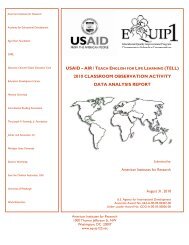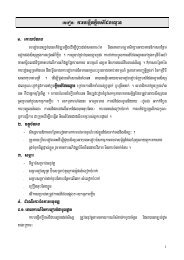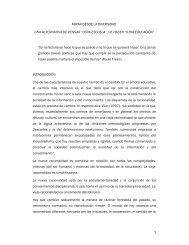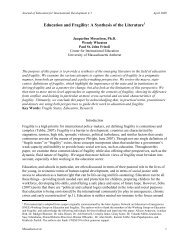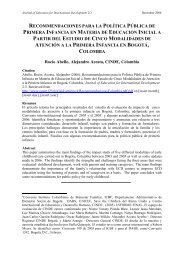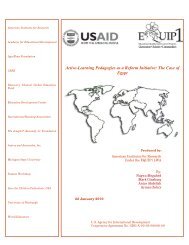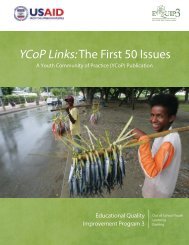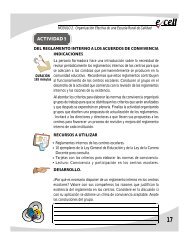The Power of Persistence: Education System ... - EQUIP123.net
The Power of Persistence: Education System ... - EQUIP123.net
The Power of Persistence: Education System ... - EQUIP123.net
Create successful ePaper yourself
Turn your PDF publications into a flip-book with our unique Google optimized e-Paper software.
political will and experience in both the MOE and the governorates. <strong>The</strong> ERP<br />
project, combining school and district level work in the seven governorates with<br />
substantial technical support at the central and governorate leadership level,<br />
supported a process <strong>of</strong> learning and confidence building. <strong>The</strong> fortuitous move <strong>of</strong><br />
the Alexandria reformers into key Ministry positions was a central factor in the<br />
accelerated reform process, as was the positioning <strong>of</strong> ERP. With established trust<br />
relationships between the Minister and USAID, and between ERP and the senior<br />
reform advisor, the substantial technical and financial resources <strong>of</strong> the project<br />
were applied to supporting the reforms.<br />
ERP supported activities that addressed all <strong>of</strong> the elements <strong>of</strong> the reform<br />
framework. In the political dimension, key activities were the process and<br />
structure <strong>of</strong> the Governorate <strong>Education</strong> Reform Network, participatory strategic<br />
planning at the governorate and central levels, extensive communications and<br />
outreach to the governorates, engagement <strong>of</strong> political and social leaders, highlevel<br />
technical assistance, conferences to generate political will, and provision<br />
<strong>of</strong> credible information and data to inform decision-makers. In the institutional<br />
dimension, complementary and supportive initiatives that drove the process<br />
included: extensive technical and financial support for strategic planning<br />
in all governorates and in the MOE; massive capacity building and policy<br />
implementation for the teacher cadre and certification; assessment <strong>of</strong> learning<br />
outcomes; EMIS quality and availability; policy formulation, and capacity<br />
building in schools in all <strong>of</strong> the governorates. In the technical dimension,<br />
on-going work at the school and district level provided both experience and<br />
evidence <strong>of</strong> impact, and refined the models and tools for instruction and<br />
school management.<br />
In spite <strong>of</strong> substantial progress achieved since 2001, the sustainability and<br />
potential impact <strong>of</strong> the reforms in Egypt are not assured. To a large extent, the<br />
reforms are still at an early stage. <strong>The</strong> significant achievements are at the level <strong>of</strong><br />
policy formulation and political will for tackling some hard issues like teacher<br />
performance, financial decentralization, and community involvement. <strong>The</strong><br />
progress on reform is vulnerable on a number <strong>of</strong> fronts.<br />
• Much <strong>of</strong> the political will needed for momentum in reform is concentrated<br />
in a handful <strong>of</strong> leaders in the Ministries <strong>of</strong> <strong>Education</strong> and Finance (MOF)<br />
and governorates. It is important to continue to broaden and strengthen the<br />
support and commitment to key reforms within the Ministries, governorates,<br />
and civil society.<br />
62<br />
SECTION 2: lESSONS fROM COUNTRY CASE STUdIES



